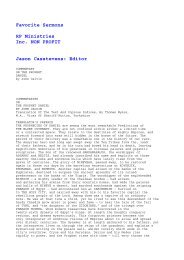Lamentations - The Sermon Depository
Lamentations - The Sermon Depository
Lamentations - The Sermon Depository
Create successful ePaper yourself
Turn your PDF publications into a flip-book with our unique Google optimized e-Paper software.
eproaches, we seek in adversities to withdraw ourselves in a manner from<br />
the observation of men; but our evil is especially doubled, when we<br />
become a spectacle to enemies; for they derive joy from our adversities,<br />
and then exult over us. When, therefore, the chosen people said, that<br />
enemies had heard, they thus showed that nothing could be added to their<br />
miseries: <strong>The</strong>y have heard, then, that I was sighing and that no one<br />
comforted me. Who had heard? all mine enemies; and they have rejoiced<br />
that thou hast done it.<br />
Jeremiah seems to intimate, that their enemies, being fully persuaded that<br />
God was displeased with his people, did on this account more freely<br />
rejoice; and at the same time they believed that it was all over with those<br />
miserable people with whom God was displeased. But I know not whether<br />
this view is well grounded. I indeed do not reject it, :nor will I dispute with<br />
any one who may hold that the enemies rejoiced, because they thought<br />
that God was become the enemy of that people, whom he had before<br />
chosen and also protected: nor is this view unsuitable; for the reprobate<br />
then fully triumph when they can boast that God is adverse to us. But<br />
when no such thought comes to their minds, they yet cease not to rejoice<br />
when they see that we are oppressed and afflicted. Though, then, they<br />
may not think of God’s hand, yet they rejoice that it is done; that is, they<br />
rejoice that we are distressed, though they understand not who the author<br />
is. We may then take the meaning simply to be, that the enemies of the<br />
Church rejoiced at that calamity, without considering who the author of it<br />
was.<br />
But, why is it expressed that God had done it? even to shew that while the<br />
ungodly think that fortune is unfavorable to us, it; is our duty to cast our<br />
eyes on God, for we ought not to judge of things according to their<br />
blindness. As, then, they ascribe not to God the glory due to him when<br />
they do not acknowledge him as judge, it ever behooves us to see by the<br />
eyes of faith what is hid from the natural perceptions of men, even that<br />
nothing happens to us except through the righteous judgment of God.<br />
Though, then, enemies had not wisdom to know how it was that the<br />
Church was afflicted, yet it behooved the Church itself to use by means of<br />
faith such a language as this, that God had done it; they rejoiced that thou<br />
hast done it.<br />
And it follows, Thou hast brought the day which thou hast called, or<br />
proclaimed; for arq, kora, has sometimes this meaning. F25 In short, the<br />
faithful now confess not only that they were afflicted by God’s hand, but<br />
also that what the prophets had so often threatened, and what had been<br />
despised, was now fulfilled. For we have seen with what pertinacity that<br />
people rejected the threatenings given by the prophets: God had often<br />
exhorted them to repent, and also had proclaimed or fixed a time for them,<br />
but without effect. <strong>The</strong>refore the faithful now reflect on what had not been<br />
sufficiently known before, even that the day was brought which had been<br />
often proclaimed. And thus they confessed, not only that they were<br />
worthy of punishment., but that it was the proper time for them to be<br />
chastised, as they had not repented after having been so often warned.<br />
He adds, But they themselves shall be as I am. Here the future tense may<br />
be considered as optative, for presently a prayer follows which confirms<br />
this view. But we may also take the meaning to be simply this, — that the<br />
faithful began to take courage, as they looked forward to the time when<br />
God would render to the wicked according to their proud and disdainful<br />
exultation’s. It follows, —<br />
<strong>Lamentations</strong> 1:22<br />
22. Let all their wickedness come<br />
before thee; and do unto them as thou<br />
hast done unto me for all my<br />
transgressions: for my signs are<br />
many, and my heart is faint.<br />
22. Veniet (aut, veniat) omnis<br />
malitia eorum in conspectum<br />
tuum, et facias illis,



